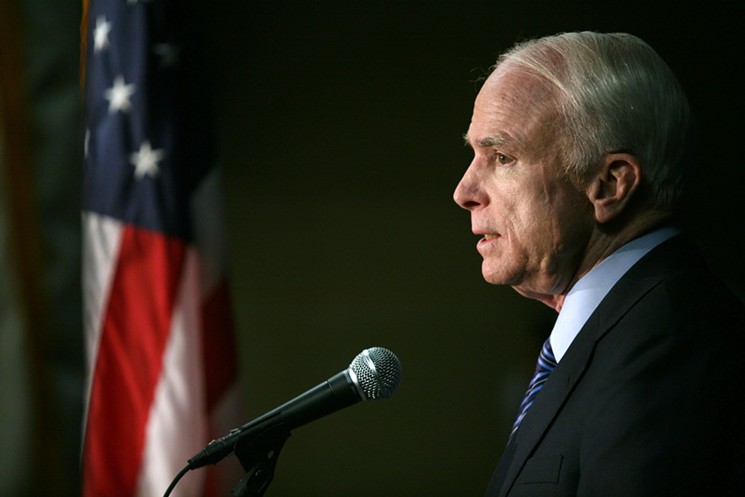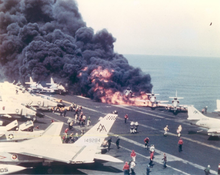

At 10:51am July 29, 1967, the USS Forrestal, an American aircraft carrier positioned in the Gulf of Tonkin off the coast of Vietnam prepared a flight deck for participation in the strategic bombing campaign, Rolling Thunder, and had a deck full of fighter aircraft loaded with ordinance. Completing the dangerous process of loading live ordinance , an A-4 Skyhawk captained by Lieutenant Commander John S. McCain III was docked at the stern of the carrier when a Zuni rocket secured to a craft on the opposite side of the deck, due to an electrical surge on the craft, spontaneously fired and released, shooting across the tarmac directly into McCain’s jet fuel tank, spilling hundreds of gallons of highly flammable fuel.
Deck crewmen, quickly realizing the extreme gravity of the situation, rushed to douse the flames. McCain got himself extracted from his cockpit, jumped down off the craft and raced across the deck as the fire crews ran past him to spray fire retardant.
McCain got half way across the deck when the first 1000 lb bomb beneath his craft ignited from the fire’s heat, blasting him 10 feet in the air, peppering him in shrapnel, and instantly disintegrating the courageous fire team behind him. Before the conflagration was over, scores of bombs exploded on the deck of the Forrestal tens of thousands of gallons of jet fuel ignited, and in the worst on deck accident in U.S. history, 134 servicemen were killed, another 161 injured. John S. McCain, so close to the center of a death defying ordeal, managed to come out of the conflagration to live another day.
Yesterday, the Maverick met an ordeal beyond even his unique survival skills, and succumbed to brain cancer at the age of 82. Like every other adversary he had the misfortune to face in his life, he proved himself both courageous and circumspect in his place in the battle to survive.
John S. McCain III left an indelible mark on the world in the 50 or so years he was a public figure. History called him from birth to be a participant, not an observer. His grandfather John McCain was an integral part of carrier actions in World War II. Foreshadowing his grandson, he was a Naval Academy graduate, hard driving, profane individual who liked to take responsibility on his shoulders, and was empowered by the proximity to danger and action. A top Pacific commander at the end of the war, he died of a heart attack just four days after the Japanese surrender, completely worn out by the demands of the job. His son, John S. McCain, Jr., followed his father’s footsteps to become a four star admiral in charge of Naval Pacific Operations in the Vietnam War. It was an unavoidable destiny, therefore, for John S. McCain III, nondescript student and having a reputation as a hell raiser at the Naval Academy, to follow his father and grandfather’s path as a Naval aviator in the midst of the Vietnam War and a participant in the fighting during his father’s command.
The Forrestal was just the first of MCain’s life altering brushes with death. The second occurred three months later from the Forrestal disaster, when on October 26, 1967, when on a bombing mission over North Vietnam, McCain was shot down by a surface to air missile. Forced to eject from the plane, McCain fractured both arms and a leg on the ejection impact, nearly drowned when he parachuted into a lake, then was dragged out by North Vietnamese troops, who permanently crushed his right shoulder with a gunstock and bayoneted him. Transported to the notorious ‘Hanoi Hilton’ prison camp, the severe injuries were left untreated, and further torture followed until it was discovered who his father was by the captors. This led to a hospitalization for basic treatment in hopes that McCain could serve as a propaganda tool against his father, and country. McCain lost fifty pounds in the ‘hospital’ and was not expected to live. When he revealed to the enemy the Maverick survival orneriness that everyone back home already knew about, he was placed in solitary confinement for the next two years. The beatings resumed in an effort to get him to sign a ‘confession of guilt for war crimes’ and he was offered early release if he would sign. The horrendous treatment could not break him, refusing any preferential treatment. He remained steadfast in the five and one half years that he was imprisoned until his release in 1972. He carried the physical and mental scars of his brutal treatment to the end of his life.
McCain returned from the war a different man, but as events that are as severe as the ones he had lived through, reinforced both his good and bad impulses. He returned to navy command and performed well, but recognized he would never achieve his ambitions to the extent that his father and grandfather did in the Navy. He turned his direction out of the military — and away from his faithful wife, who had been injured in a car accident, and suffered much of the same rehabilitation requirements that McCain endured upon returning to the States. He requested a divorce, and remarried, this time to an Arizonan who was an heir to a fortune and who’s father related to Arizonans of real influence. McCain entered Arizona politics, and won the congress seat for the Ist district as part of the Reagan wave of conservative victories, then subsequently, won the Senate seat of the retiring legendary senator Barry Goldwater.
Assumed to be a pure conservative, Senator McCain began the conversion to a contrarian that would earn him the title of political Maverick by a conflicted press, that, while enjoying his willingness to destabilize his own party unity and his love of the battle, confounded by his residual tendency to hold, for them, abhorrent conservative foundations and ‘warhawk’ persona.
He enjoyed the public world, never shying from a headline, and relished the discomfort his ‘reach across the aisle’ attitude caused his fellow Republicans. His ambitions showed full flower when he engaged in a bitter race for the Republican nomination for President in 2000 against the front runner George W. Bush, losing , but holding a fairly significant grudge in the process, that led to McCain functioning as an unpredictable thorn in the eventual President Bush’s side in legislative issues such as tax cuts, carbon taxes, campaign finance, and gun rights. He remained illogically close to John Kerry, a radical anti Vietnam war protestor following a controversial Vietnam combat experience, leading to a timid support of Bush in the 2004 election, and a further distancing from the party’s conservative core. Yet, when a quagmire and a potential ignominious defeat in Iraq loomed, MCain was unwavering in his support for President Bush’s decision against all odds and advice, to support an American military surge tactic, that turned the conflict and removed direct war in Iraq as an obstacle for future Presidents.
The moment of truth for John McCain came in 2008, when his ambitions and the party’s presidential opportunity coalesced in a Presidential nomination at the party convention. McCain worked tirelessly, but his contrariness and his lack of party discipline got him into trouble from which he never recovered. McCain made several crucial mistakes that doomed the already difficult task of defeating a Bush weary country against an unknown idealized Democrat candidate, Barrack Obama – young, sophisticated, and of mixed race — an exotic combination that proved intoxicating for a compliant press and a country looking to get a way from a war footing. McCain became disappointed that his personal rapport with the press held little sway when up against someone that exemplified their idyllic view of government. He selected an obscure candidate for Vice President in Governor Sara Palin of Alaska , who he hoped would restore his shaky relationships with conservatives, only to nearly abandon her when she proved shaky in her grasp of facts and unexperienced with the full court pressure applied by the press. He grossly misread the effect “suspending” his Presidential campaign when the October 2008 banking crisis hit, traveling to Washington to ‘work for ‘solutions’ where he was easily tarred as an accomplice in the disaster. Obama, also a Senator, wisely stayed away and let Washington flail, allowing Obama to remain clean of all the necessarily politically unpleasant decisions required to survive the crisis. McCain’s likeablity and hero status translated to nearly 60 million votes, but he was swamped in the electoral college by nearly 200. John McCain had reached the pinnacle of his political life, only to come up against a more presidentially projectable maverick than he, in Obama.
He spent his residual years in the Senate prior to his illness trying to fashion the illusory middle ground that he felt was the way forward for the country. Opposed to the Accountable Care Act as an unworkable and undemocratic bill, he ended up being the crossover vote that protected the bill against rejection in 2017, when he felt the alternative was equally unstructured and undemocratic. He sided with the Obama administration in the ill conceived actions in Egypt and Libya, but was virulently against the inactions in Syria and the process of negotiating with Iran’s theocratic dictators without Senate treaty submission. Despite being the Senator of a border state, he could never find a comfortable position on the need for border security and immigration reform. Regardless, as with all historical moments in his life, McCain positioned himself in the center of the action, and determined a course he felt he could live with, and a priority and principle he felt was consistent with his personal calling.
John S. McCain saw himself as a maverick, and like all mavericks was comfortable with the inconsistencies and flaws the maverick nature tends to expose. But more than maverick he was heroic, living through pain, torment, and controversy as if they were ennobling, rather than dehumanizing. He was authentically American in his heroism, sometimes losing the consistent and realistic for the ideal, and never, ever wavering in his love of country or mission his family had taken over multiple generations to sustain it. Choosing politics as his ultimate personal mission, he exhibited some of the recklessness that lost him the coalescence of support from all the factions that are necessary to ultimately prevail. The maverick model was, perhaps, a little ahead of its time, and McCain stopped just short of the populist impulse that would eventually position another maverick candidate, Donald Trump to achieve the ultimate prize.
John S. McCain III was above all, one great American story. His core is described in both his own memoir, Faith of My Fathers , and in the brilliant reporting of Robert Timberg in The Nightingale’s Song. We will miss John McCain as we will miss a crucial part of our Americanness, – action oriented, courageous, occasionally impulsive – but trying to find the right and true way forward.
Rest in Peace, John McCain. God Speed to the Maverick.

McCain, the man who never met a war he didn’t like, his solution to everything. The final straw in my loss of respect for him was his secret trip to Syria in 2013 to meet with ‘Freedom Fighters” aka ISIS operatives, Abu Mosa, Abu Bakr Al Baghdadi, and Mohammad Nour, among others.